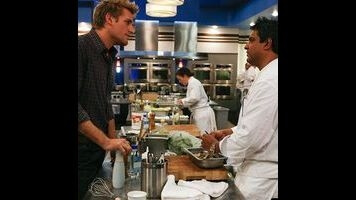Top Chef Masters: "Top Chef Master"

Listen, I get the rap on Top Chef Masters. It’s the antithesis of what reality shows are supposed to be: The contestants are uniformly professional and civil to each other (the only real drama came from mixing in Top Chef firebrands like Dale last week), the dishes never approach the sublime disasters on its sister show, and even if the chefs completely botched the job, the panel of critics were determined to let them down gently. After all, they’re playing for charity dollars and haven’t come on the show to have their well-established (and well-earned) reputations sullied. In other words, it’s too nice a show. There’s no drama.
But with all due respect to those who shrugged off Top Chef Masters as a dull facsimile of the real thing, I think tonight’s hour was a great argument in the show’s favor. It was, simply, a pure example of the sensual wonders of food—the rich and evocative flavors, the feelings and memories a wonderful meal can coax out of those who cook it and those who eat it, and the sheer aesthetic artistry that the best of the best are capable of putting on display. For me, watching the finale of Top Chef Masters was like an extended version of the “big night” sequence in Big Night. At one point in the judging, Jay Rayner suggests they just stop using their words and criticize using guttural “mmmmm” sounds instead. It was that good.
As with Top Chef proper, the last episode more or less gave the finalists a broad license to put out their absolute best dishes, with few limits and maybe a surprise or two. While still keeping the guidelines nice and loose, the concept of the final Elimination challenge was absolutely brilliant, and even kind of touching: The three chefs were to create a series of dishes based on their career. First course: Their first food memory. The second: What made them decide to become a chef. The third: Opening their first restaurant. The fourth: Where they’re going in the future. Basically, they were asked to tell the story of their lives through a meal. Pretty damned cool.
Of the four courses, the first was the one that was most inspired and bittersweet, since it brought the chefs back to their childhood, when they were living in a BBQ joint (Rick) or hand-rolling gnocchi with mom (Michael) or returning home for lunch on laundry day (Hubert). Hubert’s baeckeoffe—a stew that incorporates lamb, beef, and pork—was particularly interesting, reminding me of the eponymous dish that transports the critic back to his boyhood in Ratatouille. It looked like home on a plate.
 Keep scrolling for more great stories.
Keep scrolling for more great stories.
